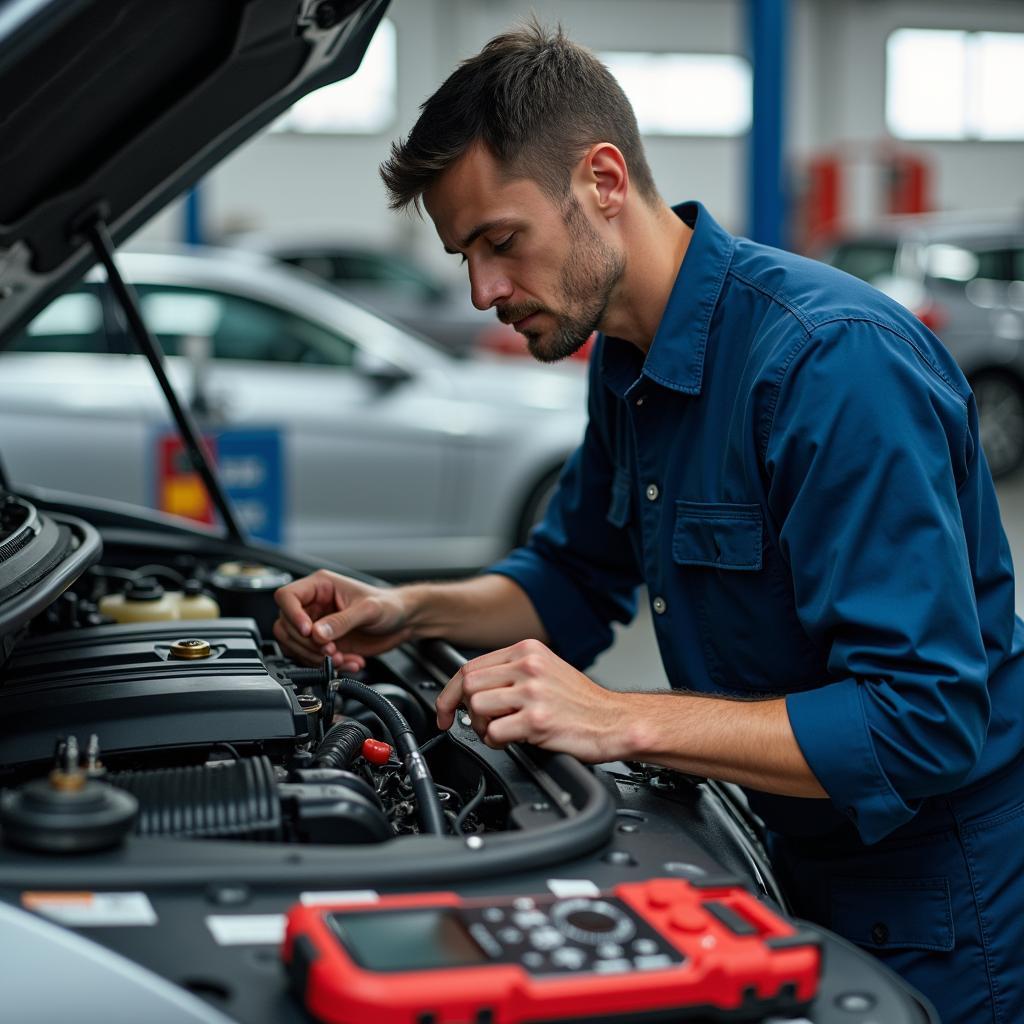Owning a car is a significant responsibility, and one of the biggest questions many car owners ask is, “Do You Have To Service Your Car Every Year?” The answer, like many things related to car maintenance, isn’t a simple yes or no. Understanding your car’s specific needs and how different factors influence its maintenance schedule is key.
Why Car Servicing Matters
Before we delve into the specifics of yearly servicing, let’s understand why car servicing is crucial. Regular servicing ensures your vehicle remains safe, reliable, and operates at peak performance.
Here’s a breakdown of the benefits:
- Safety: Servicing involves checking vital components like brakes, tires, and lights, ensuring they function correctly and reducing the risk of accidents.
- Reliability: Regular oil changes, filter replacements, and fluid top-ups prevent premature wear and tear, making your car more dependable.
- Performance: A well-maintained car offers better fuel efficiency, smoother handling, and optimal engine performance.
- Resale Value: A consistent service history adds value to your car when it’s time to sell or trade it in.
Factors That Determine Service Intervals
While the classic advice used to be to get your car serviced every year or every certain number of miles, modern vehicles and driving habits have changed the game.
Here’s what influences your car’s ideal service interval:
- Manufacturer Recommendations: Always refer to your car’s owner manual. It outlines specific service intervals based on your vehicle model and year.
- Driving Conditions: Frequent stop-and-go city driving, extreme temperatures, and hauling heavy loads can necessitate more frequent servicing than highway driving in mild conditions.
- Driving Habits: Aggressive driving with rapid acceleration and braking puts more stress on your vehicle, potentially requiring more frequent service visits.
- Vehicle Age: Older cars might require more attention and potentially shorter service intervals due to wear and tear over time.
Deciphering Service Schedules
Your car’s owner manual provides a detailed service schedule, outlining what needs attention at different mileage or time intervals. It typically includes:
- Oil and Filter Changes: Essential for engine lubrication and performance, generally recommended every 3,000-5,000 miles or six months.
- Tire Rotation and Pressure Checks: Ensures even tire wear and optimal fuel efficiency. Usually recommended every 5,000-7,000 miles.
- Brake Inspections: Vital for safety, involving checking brake pads, rotors, and fluid levels.
- Fluid Top-Ups: Includes coolant, brake fluid, power steering fluid, and transmission fluid, all essential for proper vehicle operation.
- Air Filter Replacement: Keeps the engine clean and running efficiently, usually replaced every 12,000-15,000 miles.
- Spark Plug Replacement: Essential for ignition and fuel combustion, typically replaced every 30,000 miles or more.
What Happens When You Don’t Service Your Car on Time?
Neglecting regular car servicing can lead to various problems, ranging from minor inconveniences to major repairs.
Here are some potential consequences:
- Reduced Fuel Efficiency: Dirty filters, old oil, and worn-out spark plugs can significantly impact your car’s mileage.
- Decreased Performance: You might experience sluggish acceleration, rough idling, or reduced engine power.
- Overheating: Low coolant levels or a faulty cooling system can lead to engine overheating, causing significant damage.
- Brake Failure: Worn-out brake pads or low brake fluid can compromise braking efficiency, leading to dangerous situations.
- Voided Warranty: Some manufacturers may void your warranty if you fail to adhere to the recommended service schedule.
Do You Really Need to Service Your Car Every Year if You Don’t Drive Much?
Even if you don’t clock many miles, certain fluids in your car degrade over time. Rubber components can dry out, and batteries can lose their charge. It’s generally recommended to have your car checked by a professional at least once a year, even if you haven’t reached the mileage-based service intervals.
Expert Insight
“Many people focus solely on mileage,” says John Smith, Senior Automotive Technician at CarServicePro, “but time plays a crucial role in car maintenance. Fluids deteriorate, belts and hoses can crack, and batteries can die, even in a car that’s rarely driven. An annual checkup ensures everything is in working order.”
Making Informed Decisions About Car Servicing
Ultimately, the decision of how often to service your car should be based on a combination of factors. Carefully review your owner’s manual, consider your driving conditions and habits, and don’t hesitate to consult a trusted mechanic for personalized advice.
Remember, regular car servicing is an investment in your vehicle’s longevity, safety, and performance.
FAQs
Q: Can I service my car myself?
A: While some maintenance tasks can be done at home, complex procedures require specialized tools and expertise. It’s generally recommended to have your car serviced by a qualified mechanic.
Q: How much does car servicing cost?
A: Service costs vary depending on the make and model of your car, the type of service required, and the labor rates in your area.
Q: What is preventative maintenance?
A: Preventative maintenance involves addressing minor issues before they escalate into major problems. It includes regular oil changes, fluid top-ups, and inspections.
Q: What are some signs my car needs servicing?
A: Warning lights on the dashboard, unusual noises, fluid leaks, and changes in vehicle performance are all indicators that your car might need servicing.
Need More Information?
For a deeper dive into car servicing, check out our articles on What All Things To Look For First Car Service, Is Car Service Necessary, and What Is Meant Oils Services In A Car.
You can also explore our resources on What Happens When You Don’t Service Your Car On Time and How Much Is It To Get Your Car Serviced.
Don’t wait until it’s too late. Ensure your car stays in top condition by following a regular service schedule and addressing any concerns promptly.
